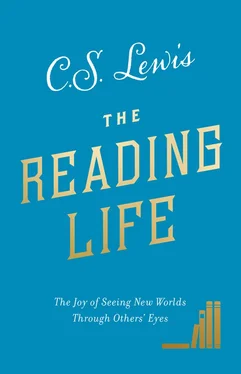William Collins
An imprint of HarperCollins Publishers
1 London Bridge Street
London SE1 9GF
WilliamCollinsBooks.com
First published in Great Britain by William Collins in 2019
First published in the United States by HarperOne in 2019
Experiment in Criticism. Copyright © 1961 by Cambridge University Press. God in the Dock. Copyright © 1967 by C. S. Lewis Pte. Ltd. Published by Eerdmans.
Studies in Words. Copyright © 1960 by Cambridge University Press.
Every effort has been made to obtain permissions for pieces quoted or adapted in this work. If any required acknowledgments have been omitted, or any rights overlooked, it is unintentional. Please notify the publishers of any omission, and it will be rectified in future editions.
The Reading Life. Copyright © 2019 by C. S. Lewis Pte. Ltd. All rights reserved A catalogue record for this book is available from the British Library
Designed by Janet Evans-Scanlon
All rights reserved. No part of this publication may be reproduced, stored in a retrieval system, or transmitted, in any form or by any means, electronic, mechanical, photocopying, recording or otherwise, without the prior permission of the publishers.
Source ISBN: 9780008307110
Ebook Edition © October 2019 ISBN: 9780008307134
Version: 2019-10-04
The revered teacher and best-selling author reflects on the power, importance, and joy of a life dedicated to reading books in this delightful collection drawn from his wide body of writings.
More than fifty years after his death, revered intellectual and teacher C. S. Lewis continues to speak to readers, thanks not only to his intellectual insights on Christianity but also his wondrous creative works and deep reflections on the literature that influenced his life. Beloved for his instructive novels including The Screwtape Letters, The Great Divorce, and The Chronicles of Narnia as well as his philosophical books that explored theology and Christian life, Lewis was a life-long writer and book lover.
Cultivated from his many essays, articles, and letters, as well as his classic works, The Reading Life provides guidance and reflections on the love and enjoyment of books. Engaging and enlightening, this well-rounded collection includes Lewis’ reflections on science fiction, why children’s literature is for readers of all ages, and why we should read two old books for every new one.
A window into the thoughts of one of the greatest public intellectuals of our time, this collection reveals not only why Lewis loved the written word, but what it means to learn through literature from one of our wisest and most enduring teachers.
CONTENTS
Cover
Title Page
Copyright
About This Book
Preface by David C. Downing and Michael G. Maudlin

PART ONE: ON THE ART AND JOY OF READING
Why We Read
How to Know If You Are a True Reader
Why Children’s Stories Are Not Just for Children
Literature as Time Travel
Why Fairy Tales Are Often Less Deceptive Than ‘Realistic’ Stories
The Case for Reading Old Books
On the Role of the Marvellous
Growing Up Amidst a Sea of Books
On Encountering a Favorite Author for the First Time
Why Movies Sometimes Ruin Books
How to Murder Words
Saving Words from the Eulogistic Abyss
The Achievements of J. R. R. Tolkien
On the Dangers of Confusing Saga with History
On Two Ways of Traveling and Two Ways of Reading
PART TWO: SHORT READINGS ON READING

Word Combinations
Sincerity and Talent
Prose Style
Not in but Through
Pleasure
Originality
The Up-to-Date Myth
Keeping Up
Wide Tastes
Real Enjoyment
Literary Snobs
Re-reading Favorites Each Decade
Reading and Experience
Free to Skip
Free to Read
Huck
The Glories of Childhood—Versus Adolescence
Jane Austen
Art and Literature
Art Appreciation
Look. Listen. Receive.
Talking About Books
The Blessing of Correspondence
In Praise of Dante
On Alexandre Dumas
The Delight of Fairy Tales
Language as Comment
Communicating the Essence of Our Lives
Mapping My Books
On Plato and Aristotle
Imagination
If Only
On Shakespeare
On Hamlet
On Leo Tolstoy
Advice for Writing
Good Reading
Appendix: Journal Exercises for Reflecting on Your Reading Life
Footnotes
About the Author
Also by C. S. Lewis
Also Available From Harpercollins
About the Publisher
THE NOTED CRITIC WILLIAM EMPSON ONCE DESCRIBED C. S. Lewis as “the best-read man of his generation, one who read everything and remembered everything he read.” [1]This sounds like pardonable exaggeration, but it comes close to being true in the realms of literature, philosophy, and classics. At the age of ten, Lewis started reading Milton’s Paradise Lost. By age eleven, he began his lifelong habit of seasoning his letters with quotations from the Bible and Shakespeare. In his mid-teens, Lewis was reading classic and contemporary works in Greek, Latin, French, German, and Italian.
And Lewis did indeed seem to remember most of what he read. One of his students recalled that someone could quote any line from the book-length Paradise Lost , and Lewis would continue the passage from memory. Another student said that he could take a book off Lewis’s shelf, open a page at random and begin reading, and Lewis could summarize the rest of the page, often word for word. [2]With that kind of memory, Lewis had little difficulty reaching for just the right quotation or reference to illustrate his point. Since it seems he was able to carry an entire library in his head, it should come as no surprise that his major scholarly books average about one thousand citations apiece. His three volumes of letters contain another twelve thousand quotations or references. Even The Chronicles of Narnia for children contain nearly one hundred echoes or allusions to myth, history, or literature.
But as Mortimer Adler once remarked, “In the case of good books, the point is not to see how many of them you can get through, but rather how many can get through to you.” Lewis would certainly agree, and he often commented how much his worldview and sensibility were shaped by the books he read—everything from Beatrix Potter in childhood to his re-reading of Homer’s Iliad, Dickens’s Bleak House, and Tennyson’s In Memoriam in the last few weeks before his death in November 1963.
Lewis was a disciplined reader and an engaged reader. Fellow scholars recall how he could sit for hours in the Bodleian Library at Oxford, perusing and absorbing texts, oblivious to what was happening in the room around him. When reading books from his private library, he often added marginal notes and created his own index on the inside cover. If he found a book unprofitable, as he did Byron’s Don Juan , he simply wrote on the inside back cover “Never again.”
Of course, reading was also one of the supreme pleasures of Lewis’s life. In his memoir Surprised by Joy Lewis described his ideal daily routine to be reading and writing from nine until one and again from five to seven, with breaks for meals, walking, or tea-time. Apart from those six hours of study every day, he also enjoyed light reading over meals or in the evening hours (pp. 141–143). All in all, Lewis’s preferred schedule seemed to include seven or eight hours of reading per day! For Lewis, reading was both a high calling and an endless source of satisfaction. In fact, his sense of vocation and avocation were virtually indistinguishable whenever he picked up a book—and often when he wrote one.
Читать дальше













